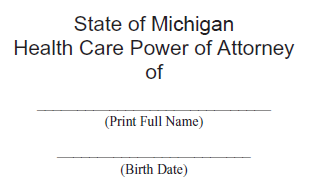Who Can Override A Power of Attorney?
A power of attorney (POA) is a legal document between two or more people. One person (the “principal”) grants another person or persons (the “attorney in fact” or “agent”) the authority to act on the principal’s behalf. This article focuses on legal aspects surrounding A power of attorney including who can override a power of attorney in the event of a disagreement.
Reasons to Override A Power of Attorney
A principal who is of sound mind may decide to change their agent designation at any time. For example, a parent may choose the eldest child as a financial POA and another sibling for healthcare POA. If the eldest child marries a gambler, or gets involved with drugs, the parent may choose another sibling as financial POA.
Once that parent is mentally incapacitated the POA may not be changed; however, there are still reasons a POA may be revoked. Here are a few examples:
- Michigan Law was not followed and the document is invalid
- The principal is being physically abused
- The principal is being robbed of their assets
- The principal was mentally incompetent when the document was established
It’s important to seek legal advice if any of these unfortunate events occur. An attorney who specializes in estate litigation can assist your family if anyone is taking advantage of your family member.
How to Revoke Power of Attorney
 If a principal is of sound mind and you suspect the agent they chose may present problems at a later date, discuss your concerns with the principal. If the principal does not agree, and your concerns are valid, contact the agent through your attorney.
If a principal is of sound mind and you suspect the agent they chose may present problems at a later date, discuss your concerns with the principal. If the principal does not agree, and your concerns are valid, contact the agent through your attorney.
If the principal is not of sound mind, contact an attorney immediately if you suspect a problem. You will end up in court to change the POA designation. You need proof that the current POA is unfit to make healthcare decisions regarding the principal or is not fulfilling the principal’s wishes regarding finances. An experienced attorney knows how to navigate the probate court system and guide your family through this difficult, emotionally charged process.
What Happens When Two Agents Disagree?
Numerous complications may arise regarding powers of attorney. Generally speaking, issues occur when family members disagree about financial matters or healthcare decisions regarding their loved one. First of all, if the principal is of sound mind, a power of attorney may be changed at any time by the principal.
Most of the time problems occur when the principal is unable to make decisions or the principal has passed away. It’s important to note that having a loved one incapacitated or pass away places great stress on any family. So, it’s crucial to establish trusted agents to act on your behalf before it becomes necessary. Basically, if two agents can’t reach an agreement the issue may end up in probate court.
Michigan Law On Who Can Override A Power of Attorney
Michigan Compiled Laws, Chapter 700 contains statutes on estates and protected individuals. Within these statutes contain legal codes on powers of attorney. According to Section 700.5511,
“…If a dispute arises as to whether a patient advocate is acting consistent with the patient’s best interests or is not complying with sections 5506 to 5515, a petition may be filed with the court in the county in which the patient resides or is located requesting the court’s determination as to the continuation of the designation or the removal of the patient advocate.” (Michigan Legislature, 1998, 700.5511 Binding effect; liability of provider; exception; dispute.)
Basically, if a patient advocate is withholding care, not providing necessary treatment, or acting in a manner outside the law, a dispute can be filed in the local county probate court and the case may enter into litigation.
Types of Powers of Attorney
There are different types of powers of attorney; however, most clients use two main types:
- Financial- A financial power of attorney has the authority to make financial decisions for you if you become incapacitated or when you pass away. Decisions may include the right to open bank accounts, pay bills, trade stocks, and cash checks, withdraw money from accounts and give gifts.
- Medical- A healthcare power of attorney allows your “agent” to make healthcare decisions for you when you become unable to care for yourself.
How to Create a Power of Attorney
Michigan law must be followed when creating powers of attorney. This is not something a person can do on their own since it requires witnesses, specific legal language, notarization and other legal details. Medical power of attorney involves designating a “Patient Advocate” and also has specific requirements regarding witnesses.
So, it’s important to seek advice from an experienced lawyer who specializes in estate planning when setting up these legal documents. Also, choosing appropriate people to act on your behalf is another critical factor regarding these decisions.
